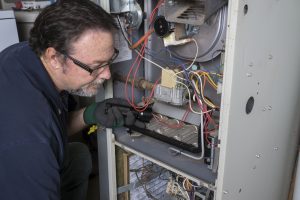The current job outlook for HVAC specialists is favorable. HVAC career opportunities keep getting better. We can largely attribute this to the invention of new HVAC technology. Have you checked out the sophisticated climate control systems in the market? These will need installers and technicians to undertake regular maintenance.
But is HVAC a good career? In this article, we will explore the A-Z of the HVAC career in 2021.
What Are the Duties of an HVAC Technician?
HVAC technicians have a range of duties that ensure heating, ventilation and air conditioning systems are functional. The most obvious duties are the installation and maintenance of HVAC systems. This job also involves performing warranty tests and assisting customers with emergency queries.
HVAC technicians are also tasked with identifying maintenance risks in the systems, as well as diagnosing mechanical and electrical faults. Further, the technicians must ensure compliance with relevant industry regulations, such as those outlined in the Occupational Safety and Health Act.
While the HVAC career review in 2021 is very promising, HVAC technicians will need additional skills to excel in the sector.
- Customer Service Skills
HVAC technicians deal with clients directly. As a result, customer service skills are imperative to have in an HVAC career.
- Physical Strength
You may not see it as a skill, however, you need physical strength and stamina to succeed in the HVAC sector.
- Mathematical Skills
As an HVAC technician, you will be required to calculate the correct load requirements to ensure HVAC systems cool and heat efficiently. HVAC technicians may also work on complicated climate control systems. As such, they will be required to assemble, disassemble and even program the system components.
- Detail-oriented
As an HVAC technician, you will be required to maintain detailed records of all the work performed. This includes the time it took to complete a specific task and the nature of the work, as well as the specific equipment used.
- Critical Thinking Skills
Every so often, you will be required to troubleshoot malfunctioning systems and ensure they function optimally.
Starting an HVAC Career in 2021
As we mentioned, an HVAC career can be quite promising. There are many HVAC titles that you may encounter along your HVAC career path. These include entry-level, professional-level, mid-level, and senior-level positions.
- Entry-level HVAC Positions
The entry-level positions are ideal for someone who is just starting their HVAC career. However, this does not mean that it does not require any professional qualifications. The most common entry-level position is the rough-in installer. These individuals are responsible for the initial phases of the installation of HVAC equipment such as thermostats, duct runs, duct boots, and electrical controls.
- Professional-level HVAC Positions
Start-up technician: These technicians are responsible for ensuring that HVAC systems work efficiently after installation. They also check that the equipment operates per the manufacturer’s standards and they record information that is required for warranty.
Service technician: Service HVAC technicians are tasked with assessing HVAC systems and identifying when maintenance is required. This position requires a technician to be a critical thinker since they often troubleshoot and diagnose HVAC systems.
- Mid-level HVAC Positions
Service Manager: This is a person who oversees department maintenance, as well as the dispatching of technicians.
HVAC control systems engineer: This individual is responsible for engineering or designing advanced HVAC control systems, often from conception to implementation.
However, to become an HVAC control systems engineer, you will be required to attain additional computer skills such as becoming proficient in CAD software. You may also be required to acquire additional licensing. This differs based on your location.
- Senior-level HVAC Positions
HVAC Superintendent/ HVAC Supervisor: These individuals are responsible for overseeing HVAC departments. Some of the tasks undertaken include dispatching technicians and communicating with customers and equipment suppliers.
What About HVAC Training?
Just like any other career, HVAC technicians require a substantial amount of training. Even with the countless HVAC career opportunities, the jobs can pose dangers to untrained technicians — not to mention the customers they work with.
You can start your HVAC education by earning a postsecondary nondegree. This is offered in different institutions such as trade schools, technical schools, or community colleges. The programs differ and typically last between 6 months and 2 years. Students can get an associate degree or a certificate.
Another way to get HVAC training is via the HVAC apprenticeship program. As a graduate, you will get to work with experienced technicians and earn as you upskill your HVAC training. This training can last between 3 and 5 years. Apprentices learn how to use the tools of the trade and how to read blueprints. They also become well-versed in safety practices.
Once the apprenticeship is completed, trainees graduate from basic HVAC tasks such as cleaning furnaces to advanced tasks such as soldering pipes.
Technicians who handle refrigerants will be required to earn their HVAC license. This is a certification requirement from the Environmental Protection Agency.
Why Should You Consider an HVAC Career?
- HVAC Career Growth Rate
According to the U.S. Bureau of Labor Statistics, the HVAC career job outlook has a projected growth rate of 5%. By 2030, there will be an estimated additional 399,400 positions that will need to be filled.
So, to answer the question: is HVAC a good career choice? Yes. With the expected growth rate, HVAC career opportunities are unlikely to diminish any time soon. Who doesn’t want a career that offers job security?
- Variety of Career Trajectories
With an HVAC career, you are not tied to one job until you retire. Rather, you can start in an entry-level position and grow from there.
- No Need For a College Degree
As we mentioned, you can start your HVAC career with basic courses and upskill. These courses are essential for helping individuals enter the industry and learn more skills on the job.
- Countless Emerging Technologies
As the HVAC industry continues to drive countless innovations, there is a need for reliable and experienced workers to handle advanced and complex systems. Also, the old HVAC systems will become less efficient and need replacement, which will lead to a rise in installations.
Bottomline
Is HVAC a good career choice? Yes. With a positive HVAC career outlook for 2021 and an increase in innovations in the industry, you are on the right path if you are considering a career in this sector.
An HVAC career path also offers great growth opportunities, meaning you will not be stuck in one position until retirement!








